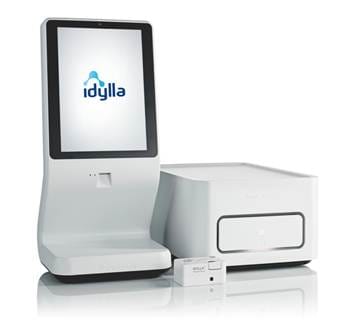Idylla™, Biocartis’ fully automated molecular diagnostics system was launched in September 2014. Since then, over 100 units have been sold. We asked the very first customer, Prof. dr. Bart Neyns to share his experience with our readers.
“We bought the platform at the launch event, so we have had it from the very first day it was available. At the moment we are only using Idylla™ to test for BRAF mutations (melanoma) in tissue samples,” says Prof. Dr. Bart Neyns, Head of Medical Oncology at UZ Brussel.”
BRAF mutations in cancer
The BRAF gene codes for a protein that takes part in cell signaling and these signals are involved in controlling cell growth. Therefore, mutations in the BRAF gene can cause excessive cell growth and proliferation, independent of the growth factors that control it, leading to the progression of melanoma, colorectal, lung, and thyroid cancer. BRAF is mutated in 7% of all cancer cases and 50% of melanoma patients carry a non-synonymous mutation at V600. In Europe, 79.000 patients per year are diagnosed with melanoma. There are several drugs on the market, such as vemurafenib and dabrafenib, that inhibit the BRAF protein mutated at V600. However, only the patients who carry the mutation will benefit from these drugs, thus efficient testing is extremely important. The BRAF test, based on Taqman PCR detects six different V600 mutations in formalin fixed / paraffin embedded (FFPE) tissue samples without the need for deparaffinization.
Saving time is essential
“Idylla™ allows for faster and more accurate treatment for patients, as the decision for which treatment is best can be made much sooner. This can be of vital importance e.g. in case of patients with melanoma, as this is a very aggressive malignancy. Before Idylla™, we were using next generation sequencing to assess the mutational status from tumor tissue samples. On average, it took 2 to 3 weeks to receive the results. Now, this takes only 5 days. The 5-days gap arises from the preliminary sample examination at the pathology department, because the quality of the sample is crucial for a correct diagnosis. The processing time for each sample in Idylla™ takes only about 90 minutes. I am very pleased that there is a only a short time period needed for generation of results and the user-friendly nature of this platform,” explains Prof. Neyns.
Liquid biopsy as the future perspective
“The best way to ultimately minimize the sample-to-result time would be performing the tests on fresh tissue or plasma. We are collaborating with Biocartis on developing a BRAF test that will use plasma instead of tumor tissue as a sample,” continues Prof. Neyns.
Tumor cells release small pieces of their DNA into the bloodstream, called cell-free circulating tumor DNA (ctDNA). This DNA appears to be an extremely effective, sensitive and specific biomarker. Because it is found in plasma, it provides a non-invasive and less risky alternative than tumor biopsies for monitoring cancer progression. Another advantage of ctDNA testing is that therapy can be started before the location of the actual tumor is known. The research on BRAF ctDNA testing could be carried out thanks to a generous donation from a patient of Prof. Neyns to the “Antikankerfonds” and “Friend for Life” Fund, the fundraising program of UZ Brussel.
Biocartis is also developing cartridges that can handle RAS and EGFR mutations to broaden the applicability. This year 4 new cartridges with assays targeting mutations involved in colon cancer will reach the market. In 2016, the Lung Cancer Panel (LCP) and Micro Satellite Instability (MSI) tests for colorectal cancer will be launched. The spectrum of the tests will be further broadened by liquid biopsies, which will perform the diagnosis based on cell-free circulating tumor DNA.
How much does it cost?
The BRAF assay (cartridge) costs around 150 euros. The cost of the traditional test varies between 115 and 395 euros. Expanding the spectrum of Idylla™ tests will not only reduce healthcare costs but it will make treatments more effective by offering physicians the easiest and the fastest access to the patient’s genetic profile. This will ultimately benefit the patients, as faster implementation of the most suitable therapy will result in better treatment outcomes.


